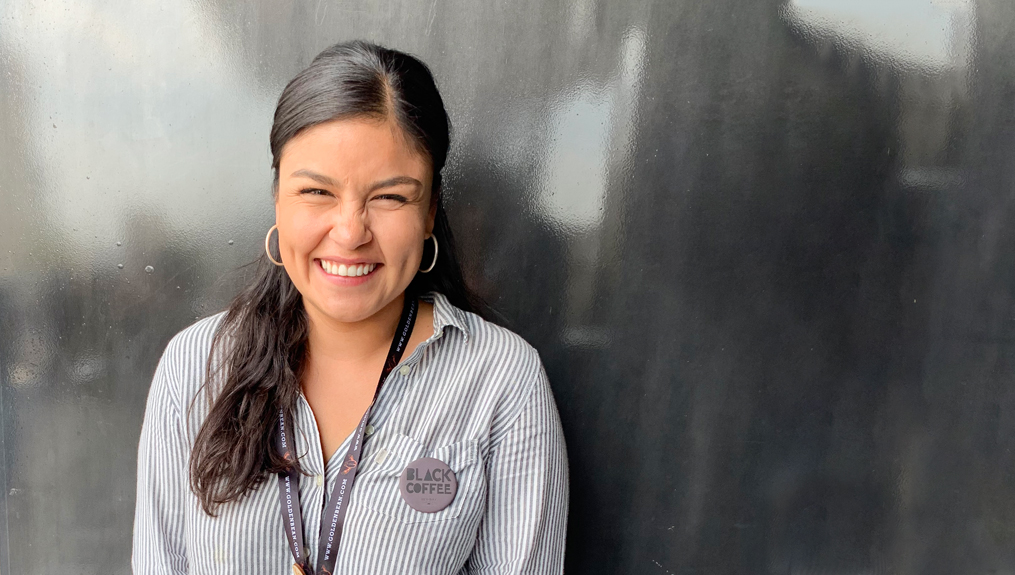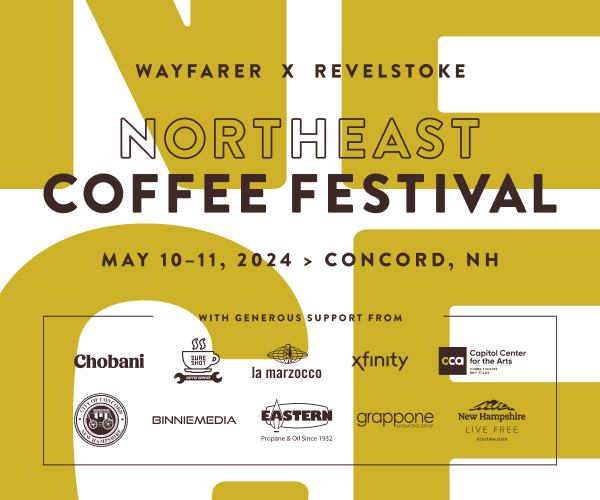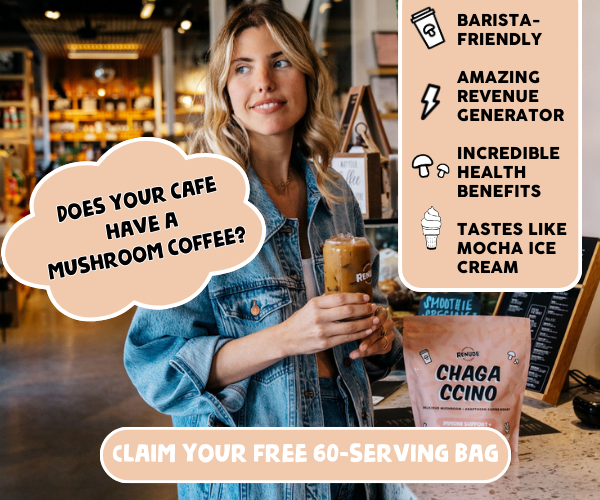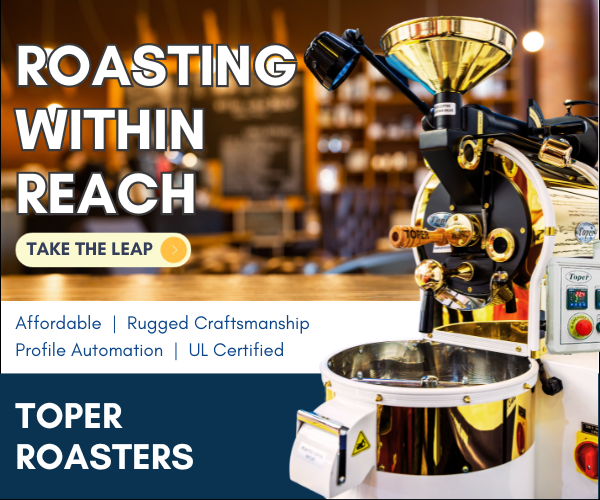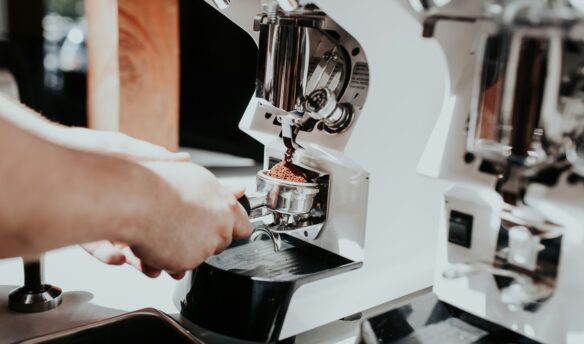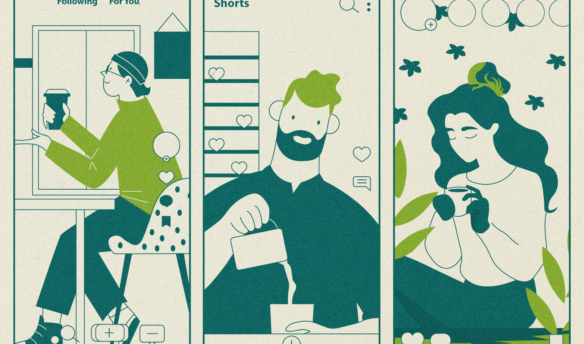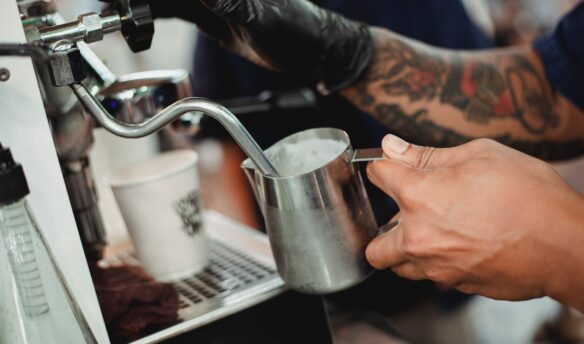Karla Mancio, photo by Caitlin Peterkin
[T]he 2019 Golden Bean North America Roasters Competition & Conference, held September 11–14, brought together roasters, baristas, café owners, and coffee professionals from all over the continent for a week of cupping, seminars, networking, and a whole lot of fun. After four years in Portland, Oregon, the event relocated to Nashville, Tennessee—a move that saw many first-time submissions and attendees.
One of those attendees was Karla Mancio, Q grader and head roaster at Red Bay Coffee in Oakland, California. Fresh Cup sat down with Mancio one afternoon to discuss her background in the industry, her Golden Bean experience, and why representation matters.
This interview has been edited for clarity.
How did you get started in the industry?
I got into the coffee industry by chance… An opportunity [at Cibo in Sausalito] came to me when I was in school doing an English education program. I had the full intention of [going into education], but I found a solid, steady job that was supportive, and, at 19, taught me great service skills. I realized that people were waiting in line outside to have one cup of coffee…[I began] understanding the industry and from the café standpoint, people waited and were willing to pay the value of a high-quality product and consistent product.
This is the time that Blue Bottle had external accounts, and we were one of them. I got trained as a barista through Blue Bottle. Blue Bottle did so much for the Bay Area to introduce specialty coffee that I’ve run into so many people that got their toes wet into coffee because of Blue Bottle. Which really says a lot for the company, that they were really driving coffee in the Bay Area to a different level.
Once Blue Bottle removed themselves from having external accounts, Tera [Ancona, Cibo’s co-owner] decided that we were going to give coffee roasting a try. I was still pursuing a degree, and this was a solid, steady paycheck for me with a great support system. And the more that I got involved in coffee, the more this “coffee bug” got into me. Everything I talked about was about coffee, to my mom, to my friends. And the closer that I came to finishing a degree, the more that I was panicking. At that point I told my mom that I was going to be in an industry that, in a country where she comes from, doesn’t make money.
Where’s that?
Guatemala—I’m actually a DACA student. I was born in Guatemala and I was brought here as a child. And so trying to convince my mom that everything was going to be okay, and that this pursuit of a six-year degree (instead of a four-year degree, because I’m working and my mom was helping me pay for it), that I’m actually not gonna do that, I’m actually just going to go serve coffee. Which was a challenge in itself because there was an idea of like, I can’t just be another brown person in service. It was something about that—that I needed to feel more, I needed to be intellectually stimulated and not just be looked at as a brown person in service.
How did you address your desire to change careers with your mom?
Her concern was that coffee as a commodity in Guatemala doesn’t sustain a family—you’re very trapped in what you do, where you are, and your kids’ future. And so for her, as somebody that came to the States, lugging me around, to tell your parents [who] left a country because they couldn’t make money, and you’re deciding to go into an industry like this, it’s really emotional. [But I said], “I’m gonna do it. I’m gonna do it.”
I had left Cibo in Sausalito and then I needed a job again. I [asked Tera for a job again] and I was back working in coffee. And [then I told her] I want to be a roaster…I shadowed her on my own time for about three months, just looking and seeing what her process was and trying to understand. I told her, I will be here if I can go to learn how to roast. So they sponsored me through the roasting course at Boot Coffee. I did my roast training in San Rafael and I knew, at that point, “This is it.”
I like creating something that people put into their body and consume, [it] translates into the energy that people are putting into their body. It took me about a year to decide that I needed to be, as a brown woman in coffee [on the consumer-facing side], I needed to have something that allowed me to feel confident in my opinions and talk about the coffee in the way that I want to.
I was with Cibo for about eight years and they sponsored me through my education and they encouraged me to pursue bigger. They always told me that whenever I was ready to fly somewhere else, that they would be very proud of me.
And then Red Bay came knocking.
Tell me more about how you got involved at Red Bay.
I’ve been at Red Bay since January. They came looking around November and I was like, well, I’ve been [at Cibo] for eight years and it’s the holiday season.…I told them at the time that I couldn’t leave right then and there, but if [in a few months] they were still looking for somebody then please, give me a call, there’s no harm in continuing the interview process.
In the process of all of the interviews, it just felt good. I really aligned with their mission statement and I [needed to] intellectually be stimulated more, I needed to learn more. And [now] I’m learning operations, I’m learning how to efficiently and empathetically manage people.
https://www.instagram.com/p/B2fqzJ4olpG/?utm_source=ig_web_button_share_sheet
I just turned 30, just got engaged…life is really like coming together in a way that, if I looked back three years, I was in a very emotional [place], like, “Where’s my life going?” Having faith that things will work out is amazing. And patience—eight years [of] patiently waiting and wanting to do something.
I had to come up with a much bigger life goal to justify me being in coffee. I was like, okay, if I can help one community in Guatemala to help improve women’s literacy through coffee, then I will have fulfilled everything that I wanted to do.
Is that the end goal for you?
I don’t know! I’m looking maybe at some point being a consultant. I love the grind that is roasting. It’s tough on a body, you know, the lifting and the lugging. I really enjoy being physical, but I also know that my body needs something else at some point. And so I will work in coffee roasting for as long as my body will allow me to. And then at some point I would like to work more with my brain than with my body: if I at some point can be a partial owner or a minority owner of a coffee farm in Guatemala and [help] improve either the quality of the product or just be able to get in contact with the right market, ask for the right amount of money that will help.
Women’s literacy is so intrinsically tied to an economic standing of a community that when women’s literacy rates improve, so does the economic standing of the entire community. My goal is at some point be able to offer scholarships for children of farmers to be able to continue education and to learn how to read. Because you can do anything if you know how to read.
Why were you interested in attending Golden Bean?
My goal this year is to really put myself out there a little bit more and have people see my face. What I want to do later in life at some point, like consult, people need to be familiar with people that they trust…These are the kind of things that I want to be attending. I want to be in the coffee world. I think it is important for my face to be in coffee on the consumer end. To me it’s really important to represent Guatemala as intellectual, not just labor, or at least not relegated to be just [labor]. If given the opportunity, people can shine in all these different places, and a white man’s face doesn’t always have to represent them. My goal is to represent Guatemalans on the side of being able to create a product, not just a green product, but a beautiful and tasty product that can sell for four bucks, five bucks a cup.
I don’t think that Golden Bean had ever really crossed my sight [until my coworker was mailed the submission bags]. I felt really confident of our lineup, and one of the coffees needed just needed a little bit of attention….We were like, look, it’s already in production, bag it up, we’ll send it, [and I would go for the company]. It just happened to land on a week that I wasn’t needing to be physically roasting, so it just all came together in the right way.
What do you want to bring back to Red Bay from this week?
I am really, really looking forward to bringing back constructive feedback from my team. Red Bay is growing at such a fast pace and I’m really wanting to make sure that we are growing and pushing our mission, but also striving to provide really high-quality and consistent coffee. I’m looking forward to the feedback and see what people think of the coffee and hopefully maybe win something!
How does your mom view your career now? Is she proud of where you are?
Oh my god, immensely proud! I think it took her about a year for her to [realize] I’m up at the crack of dawn and really putting in hours and always talking coffee. I just expressed that I’m actually really happy doing what I do. I think her goal was just to provide me something that I can make a good living on. I was gonna be a teacher, [but] coffee roasting has provided me a comfortable means in the Bay Area for the time.
That in itself can be a challenge. I can say I’ve lived by myself in the Bay Area because I’ve worked in coffee, and it’s sustained a very comfortable lifestyle. I see my trajectory moving upwards. I think she feels really comfortable knowing that I will be okay….I don’t think her concern was pushing me to be in a [specific] industry. I think she just wanted it to be anything that will provide me a comfortable and safe living—and it has! I’m happy I get to live in the Bay Area, it’s my home.
Thankfully coffee has allowed me to do that.

